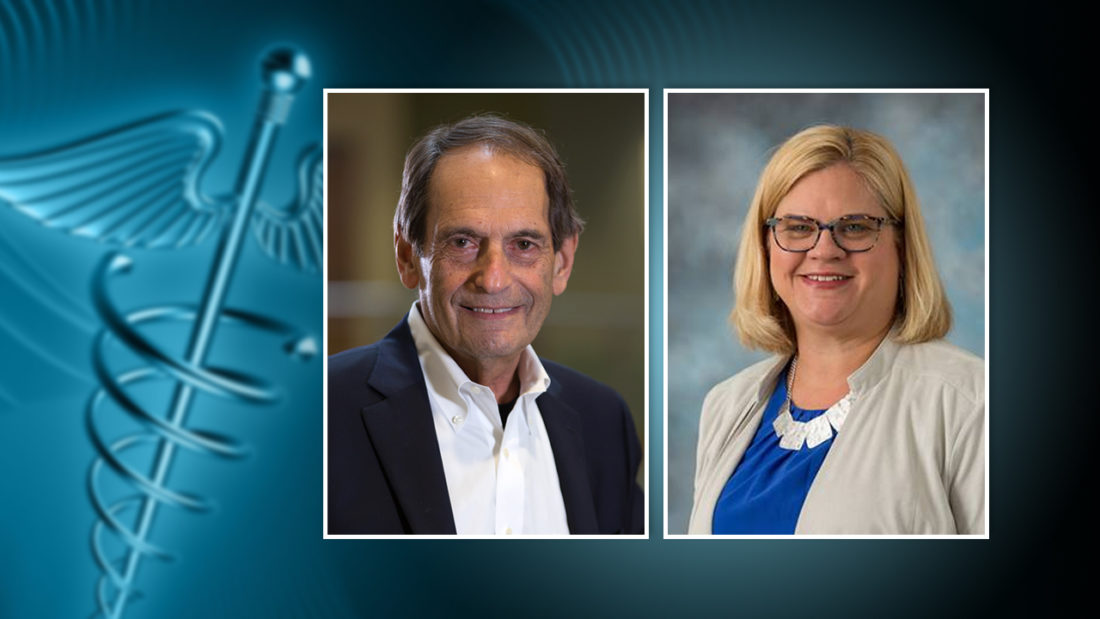Two medical experts will discuss “Gene Therapy: The Future is Now” at the annual Rare Disease Day Symposium at the Frank H. Netter MD School of Medicine at Quinnipiac University, 370 Bassett Road, from 1-5 p.m. on Friday, Feb. 25.
The plenary address will be delivered by Dr. Jerry R. Mendell, the Dwight E. Peters and Juanita R. Curran Endowed Chair in Pediatric Research at the Abigail Wexner Research Institute at Nationwide Children’s Hospital, and professor of pediatrics and neurology at Nationwide Children’s and The Ohio State University, and Kelly Lehman, a certified family nurse practitioner who serves as regulatory nurse practitioner at the Center for Gene Therapy at Nationwide Children’s Hospital. This symposium is free and open to the public, but registration is required. Register here.
“Rare Disease Day is a global event that raises awareness of over 7,000 rare diseases,” said Carolyn Macica, associate professor of medical sciences at Quinnipiac and chair/coordinator and faculty adviser for the program. “This symposium, which Quinnipiac Netter has hosted since 2015, provides an opportunity for patients, family members, clinicians and researchers to share their stories, research and insights into the development of novel therapeutics. Our mission is to promote interprofessional healthcare education and awareness of and advocacy for the rare disease community.”
Dr. Phil Boiselle, dean of the School of Medicine, will welcome the audience and introduce Dr. Demetrios Braddock, associate professor of pathology at the Yale University School of Medicine and co-founder at Inozyme Pharma, Inc. Braddock will deliver the keynote address, “Bench to Bedside: Development of Novel Therapeutics for Rare Calcification Disorders.”
Patients and Caregiver Panel
The symposium will feature a panel of patients who will discuss a rare disease either they or a loved one has. Jonathan Dicks, a critical care emergency room nurse and small business owner, will discuss his nine-year-old daughter’s battle with cystinosis, a rare, genetic, metabolic, lysosomal storage disease that causes an abnormal accumulation of the amino acid cystine in various organs and tissues of the body such as the kidneys, eyes, muscles, pancreas and brain.
He will be joined by a patient with mast cell activation syndrome, which causes her to experience repeated episodes of anaphylaxis, including allergic symptoms such as hives, swelling, low blood pressure, difficulty breathing and severe diarrhea; and the parent of a patient with Duchenne muscular dystrophy, a genetic disorder characterized by progressive muscle degeneration and weakness due to the alterations of a protein called dystrophin that helps keep muscle cells intact.
Patricia Weltin, CEO and founder of Beyond the Diagnosis, a registered nonprofit providing art and science to inspire research and innovation of treatments for people living with orphan and neglected diseases, will round out the panel.
Denise D’Ascenzo Foundation Youth STEM Award Recipients
The first recipients of the Denise D’Ascenzo Foundation Youth STEM Award will be recognized for their engagement and excellent execution of the Science Friday Experiential Genetics Program in collaboration with St. Martin de Porres Academy in New Haven.
Beyond the Diagnosis Art Exhibit
Beyond the Diagnosis will have an art exhibit featuring portraits of individuals with rare diseases in the lobby of the Center for Medicine, Nursing and Health Sciences.
For more information, call 203-582-8652.
